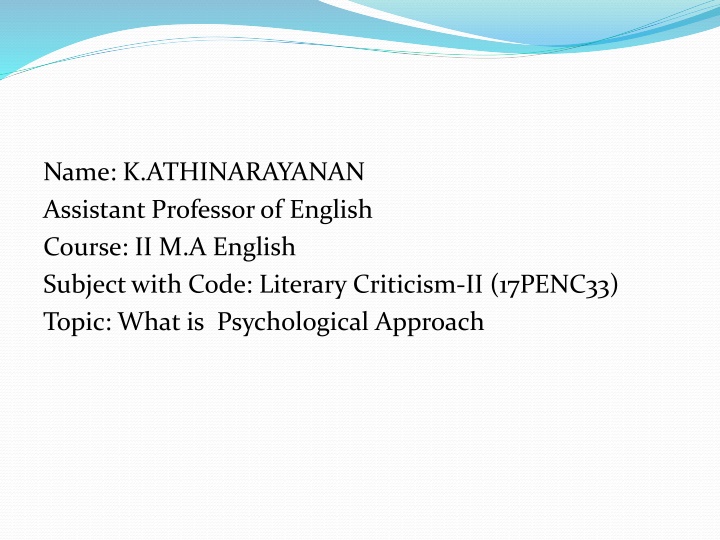
Psychological Approach in Literary Criticism
Explore the Psychological Approach in Literary Criticism, focusing on Freudian and Jungian perspectives. Learn how critics analyze characters' motivations and authors' psyche, the advantages and disadvantages of this approach, and its application in interpreting literary works. Delve into the influence of Sigmund Freud on modern psychoanalytic criticism and the importance of understanding writers' psychological states in literary analysis.
Download Presentation

Please find below an Image/Link to download the presentation.
The content on the website is provided AS IS for your information and personal use only. It may not be sold, licensed, or shared on other websites without obtaining consent from the author. If you encounter any issues during the download, it is possible that the publisher has removed the file from their server.
You are allowed to download the files provided on this website for personal or commercial use, subject to the condition that they are used lawfully. All files are the property of their respective owners.
The content on the website is provided AS IS for your information and personal use only. It may not be sold, licensed, or shared on other websites without obtaining consent from the author.
E N D
Presentation Transcript
Name: K.ATHINARAYANAN Assistant Professor of English Course: II M.A English Subject with Code: Literary Criticism-II (17PENC33) Topic: What is Psychological Approach
Introduction Psychological critics view works through the lens of psychology. They look either at the psychological motivations of the characters or of the authors themselves, although the former is generally considered a more respectable approach. Most frequently, psychological critics apply Freudian psychology to works, but other approaches (such as a Jungian approach) also exist. Freudian approach: Involves pinpointing the influence s of the character s ego, superego, and id, as well as pointing out the sexual implications in the symbols and imagery, since Freudians believe that all human nature is motivated by sexuality. Jungian approach: The Jungian theory is concerned with the process of what makes a person different form everyone else, called individualism. Jung focuses on three parts of the human mind; the shadow (villain in literature,) the persona, (hero,) and the anima (heroine.) Jung is also very influential in archetypal literary criticism.
Background Modern psychoanalytic criticism was created by Sigmund Freud. Before this idea became popular in the 1950 s, psychoanalytical critics focused more on the author s psyche than the readers. Literary works were read sometimes unconvincingly as fantasies that allowed authors to indulge repressed wishes, to protect themselves from deep-seated anxieties, or both. Freud felt that psychoanalytical critics should instead focus on the way that author s create literary works to appeal to the reader s repressed wishes and fantasies.
Advantages to the psychological approach This is a very useful tool for understanding literary works in which the characters have obvious psychological issues. Having insight into a writers psychological state can give readers a greater understanding of their work. Psychological literary criticism is easily applied to works that are highly symbolic.
Disadvantages to the psychological approach With all the focus on the psychological aspect, the actual piece can end up being ignored. Critics can try to diagnose dead authors writing and end up as not the best evidence for psychology. The art in the piece can end up being completely overlooked with all the other analysis.
Psychological Approach to Memorial Day for the War Dead In the poem Memorial Day for the War Dead, the author, Yehuda Amichai discusses how death, the fear of it, its unavoidability, can act as a common unifier between people. He writes, And everything is in three languages: Hebrew, Arabic, and Death. Although Hebrew and Arabic have worked as both cultural and language barriers in Israel, death is a common bond that unites all people, everywhere. Although Amichai was an Israeli citizen who fought against the Palestinians in the Arab-Israeli war, he was able to see the unifying factor of death amongst these two rival ethnic groups. He viewed the situation fairly objectively, unlike many other people living in Israel who are so caught up in the violence and hate that surrounds them that they are unable to see any shades of grey. Because of this, it can be said that Amichai is higher up on Maslow s hierarchy of needs, transcending beyond the need to belong and possibly even esteem needs, leaving him a self- actualized person, capable of viewing the Israeli-Palestinian conflict from every angle, and therefore wanting peace.
E-sources http://allpsych.com/images/iceberg.gif www.freudfile.org/psychoanalysis/definition.html www.psychoanalysis.net/ www.personalityresearch.org/psychoanalysis.html




















